Module10 A holiday journey Unit1 What did you do?同步测试卷(含解析)
文档属性
| 名称 | Module10 A holiday journey Unit1 What did you do?同步测试卷(含解析) | 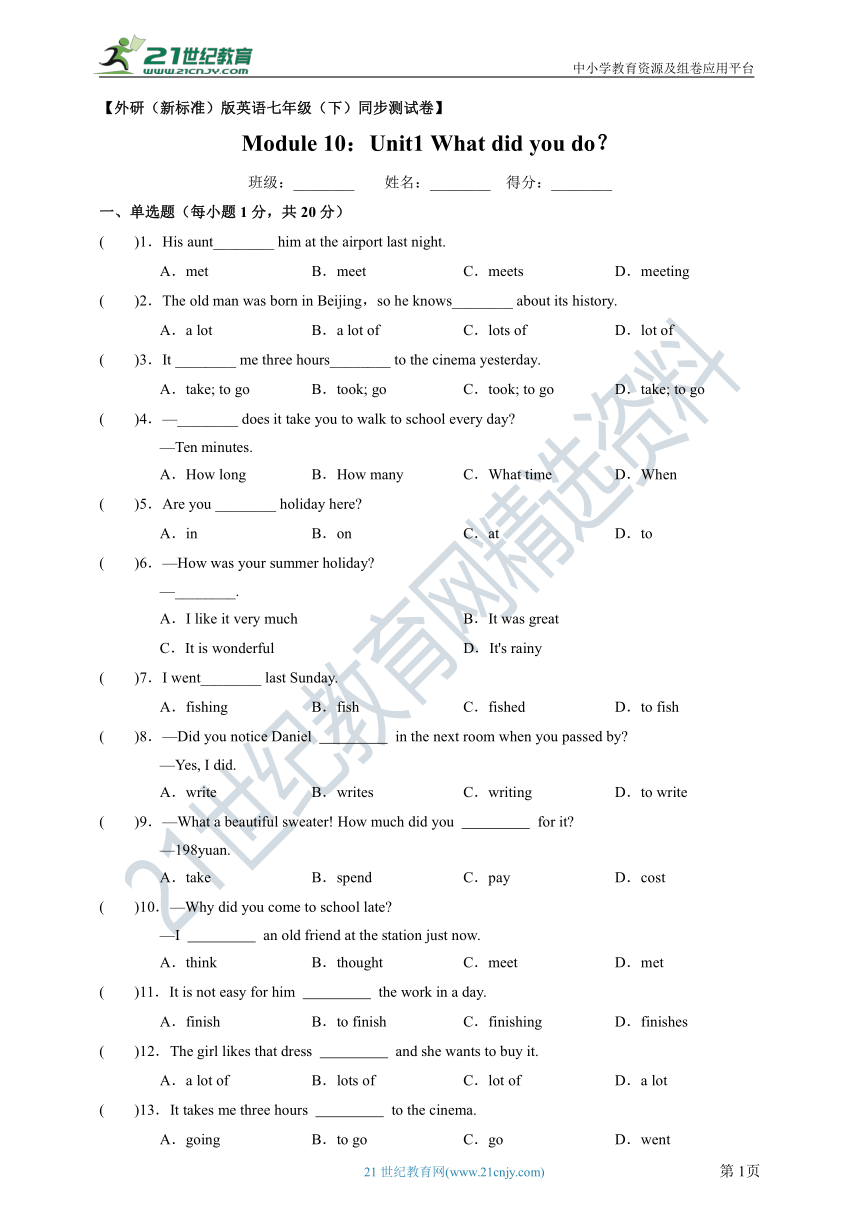 | |
| 格式 | zip | ||
| 文件大小 | 917.1KB | ||
| 资源类型 | 试卷 | ||
| 版本资源 | 外研版 | ||
| 科目 | 英语 | ||
| 更新时间 | 2020-05-31 06:10:09 | ||
图片预览

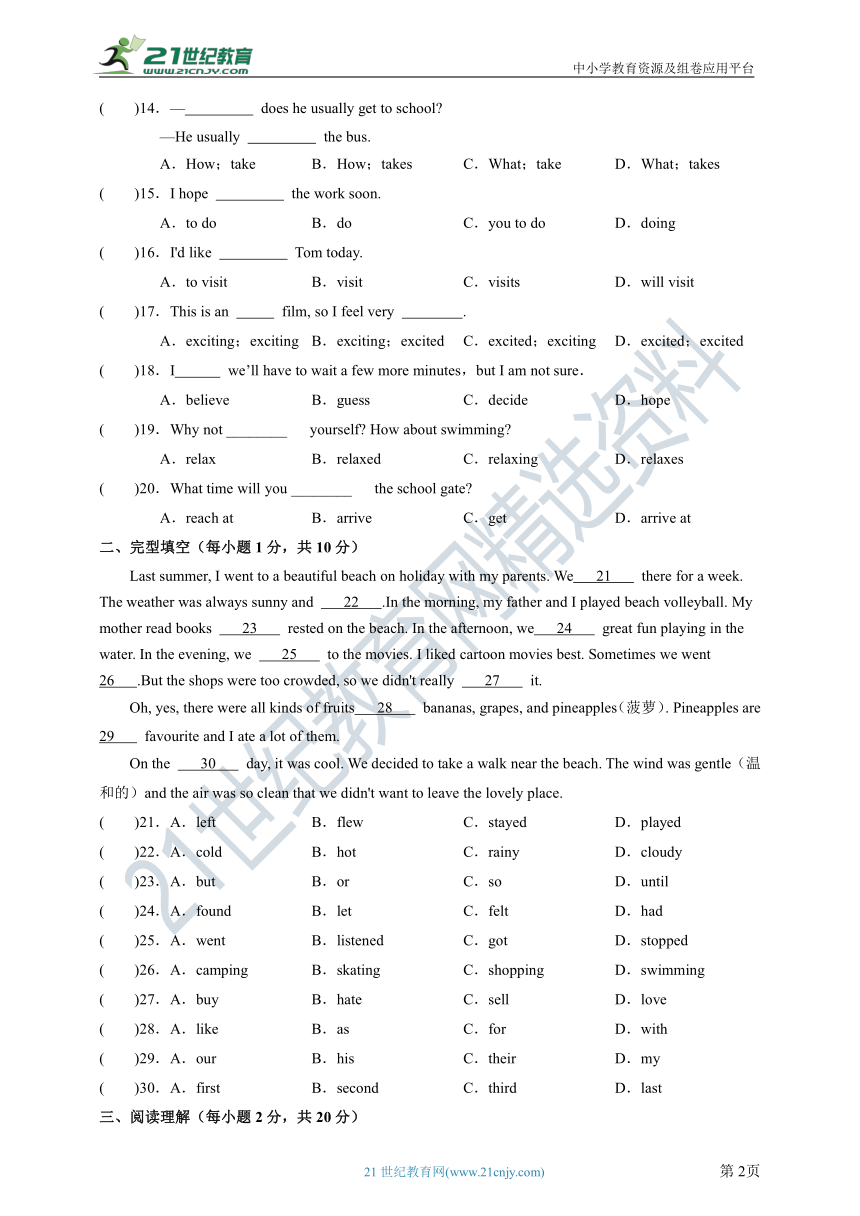
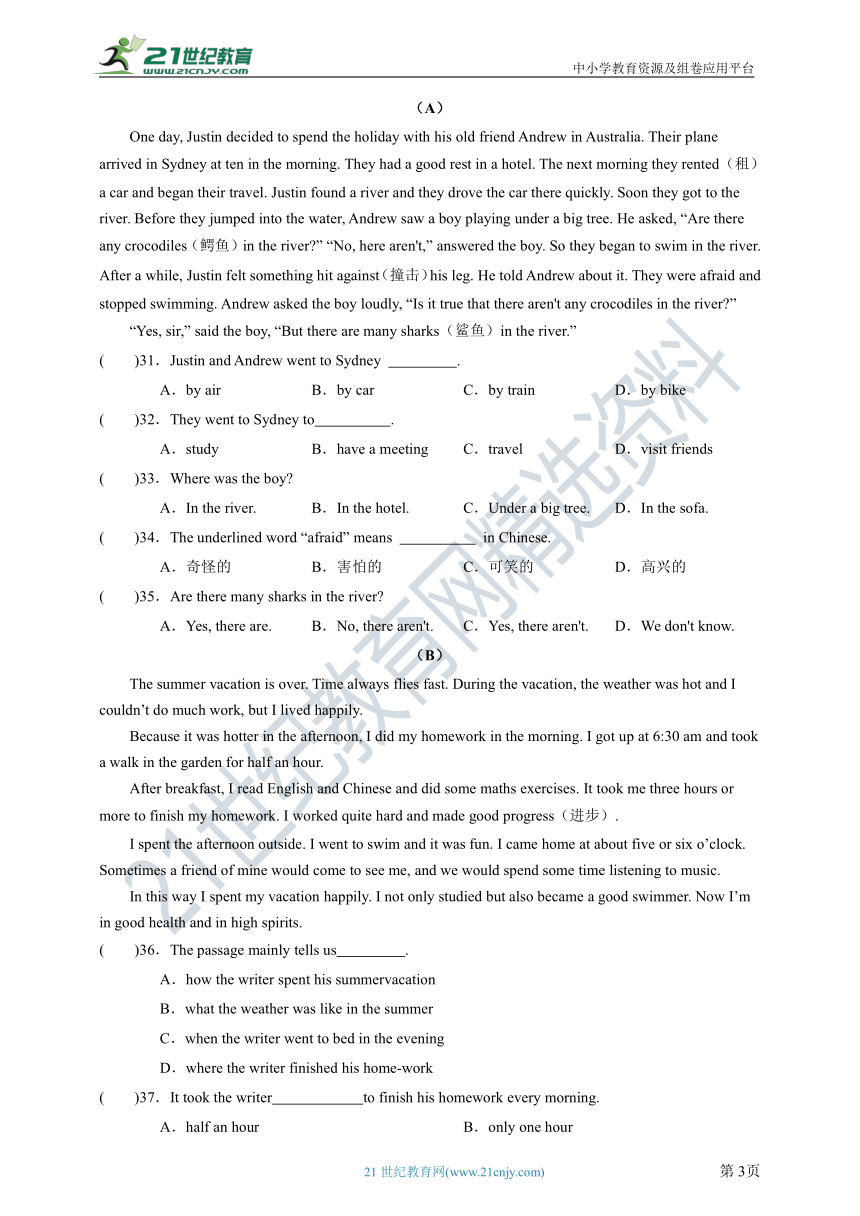
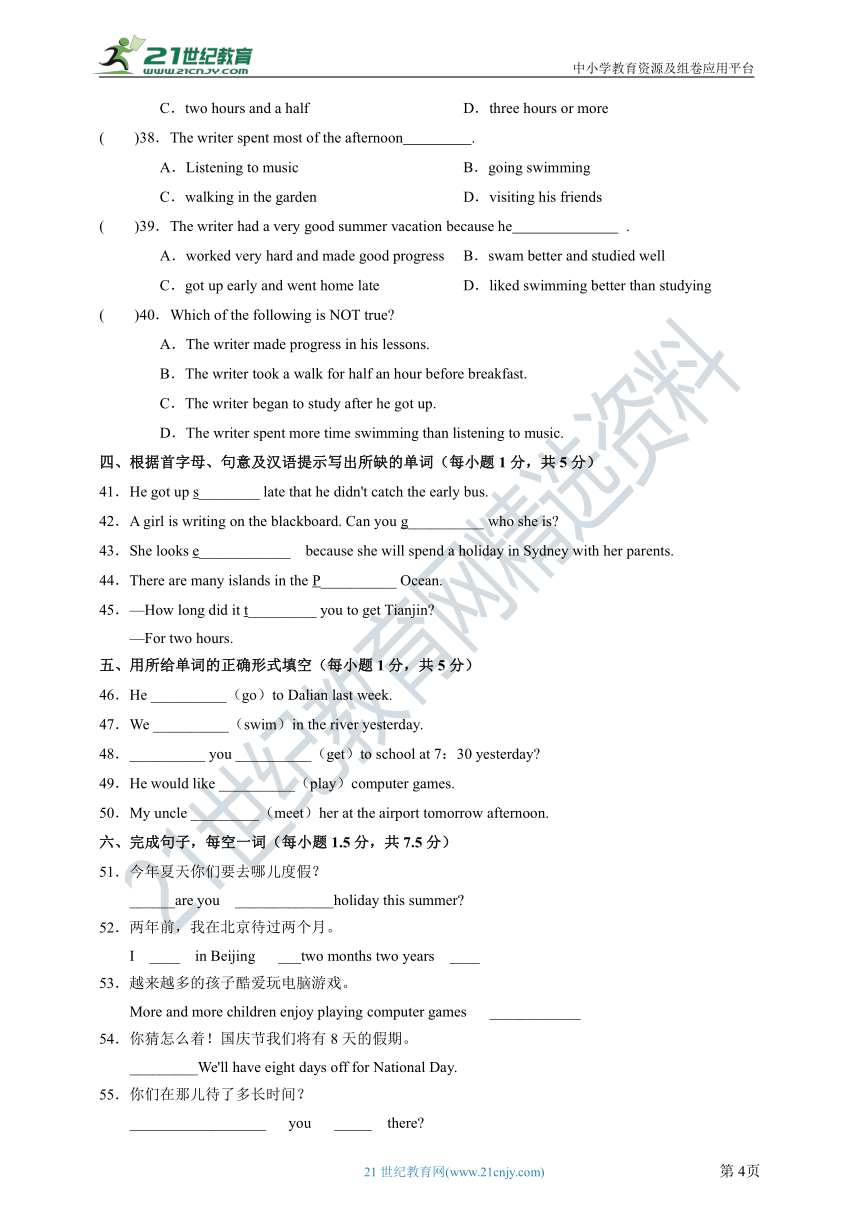
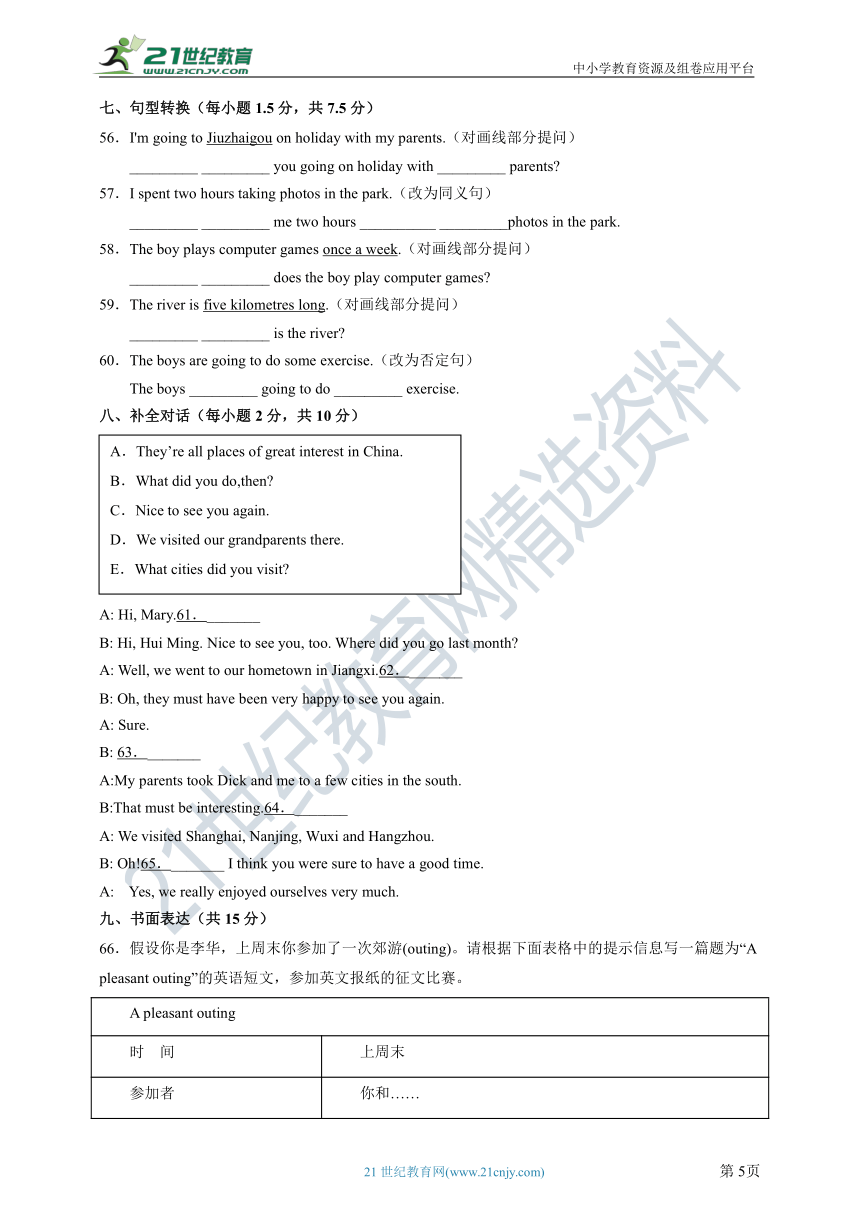
文档简介
中小学教育资源及组卷应用平台
【外研(新标准)版英语七年级(下)同步测试卷】
Module
10:Unit1
What
did
you
do?
班级:________
姓名:________
得分:________
一、单选题(每小题1分,共20分)
(
)1.His
aunt________
him
at
the
airport
last
night.
A.met
B.meet
C.meets
D.meeting
(
)2.The
old
man
was
born
in
Beijing,so
he
knows________
about
its
history.
A.a
lot
B.a
lot
of
C.lots
of
D.lot
of
(
)3.It
________
me
three
hours________
to
the
cinema
yesterday.
A.take;
to
go
B.took;
go
C.took;
to
go
D.take;
to
go
(
)4.—________
does
it
take
you
to
walk
to
school
every
day?
—Ten
minutes.
A.How
long
B.How
many
C.What
time
D.When
(
)5.Are
you
________
holiday
here?
A.in
B.on
C.at
D.to
(
)6.—How
was
your
summer
holiday?
—________.
A.I
like
it
very
much
B.It
was
great
C.It
is
wonderful
D.It's
rainy
(
)7.I
went________
last
Sunday.
A.fishing
B.fish
C.fished
D.to
fish
(
)8.—Did
you
notice
Daniel
in
the
next
room
when
you
passed
by?
—Yes,
I
did.
A.write
B.writes
C.writing
D.to
write
(
)9.—What
a
beautiful
sweater!
How
much
did
you
for
it?
—198yuan.
A.take
B.spend
C.pay
D.cost
(
)10.—Why
did
you
come
to
school
late?
—I
an
old
friend
at
the
station
just
now.
A.think
B.thought
C.meet
D.met
(
)11.It
is
not
easy
for
him
the
work
in
a
day.
A.finish
B.to
finish
C.finishing
D.finishes
(
)12.The
girl
likes
that
dress
and
she
wants
to
buy
it.
A.a
lot
of
B.lots
of
C.lot
of
D.a
lot
(
)13.It
takes
me
three
hours
to
the
cinema.
A.going
B.to
go
C.go
D.went
(
)14.—
does
he
usually
get
to
school?
—He
usually
the
bus.
A.How;take
B.How;takes
C.What;take
D.What;takes
(
)15.I
hope
the
work
soon.
A.to
do
B.do
C.you
to
do
D.doing
(
)16.I'd
like
Tom
today.
A.to
visit
B.visit
C.visits
D.will
visit
(
)17.This
is
an
film,
so
I
feel
very
.
A.exciting;exciting
B.exciting;excited
C.excited;exciting
D.excited;excited
(
)18.I
we’ll
have
to
wait
a
few
more
minutes,but
I
am
not
sure.
A.believe
B.guess
C.decide
D.hope
(
)19.Why
not
________
yourself?
How
about
swimming?
A.relax
B.relaxed
C.relaxing
D.relaxes
(
)20.What
time
will
you
________
the
school
gate?
A.reach
at
B.arrive
C.get
D.arrive
at
二、完型填空(每小题1分,共10分)
Last
summer,
I
went
to
a
beautiful
beach
on
holiday
with
my
parents.
We
21
there
for
a
week.
The
weather
was
always
sunny
and
22
.In
the
morning,
my
father
and
I
played
beach
volleyball.
My
mother
read
books
23
rested
on
the
beach.
In
the
afternoon,
we
24
great
fun
playing
in
the
water.
In
the
evening,
we
25
to
the
movies.
I
liked
cartoon
movies
best.
Sometimes
we
went
26
.But
the
shops
were
too
crowded,
so
we
didn't
really
27
it.
Oh,
yes,
there
were
all
kinds
of
fruits
28
bananas,
grapes,
and
pineapples(菠萝).
Pineapples
are
29
favourite
and
I
ate
a
lot
of
them.
On
the
30
day,
it
was
cool.
We
decided
to
take
a
walk
near
the
beach.
The
wind
was
gentle(温和的)and
the
air
was
so
clean
that
we
didn't
want
to
leave
the
lovely
place.
(
)21.A.left
B.flew
C.stayed
D.played
(
)22.A.cold
B.hot
C.rainy
D.cloudy
(
)23.A.but
B.or
C.so
D.until
(
)24.A.found
B.let
C.felt
D.had
(
)25.A.went
B.listened
C.got
D.stopped
(
)26.A.camping
B.skating
C.shopping
D.swimming
(
)27.A.buy
B.hate
C.sell
D.love
(
)28.A.like
B.as
C.for
D.with
(
)29.A.our
B.his
C.their
D.my
(
)30.A.first
B.second
C.third
D.last
三、阅读理解(每小题2分,共20分)
(A)
One
day,
Justin
decided
to
spend
the
holiday
with
his
old
friend
Andrew
in
Australia.
Their
plane
arrived
in
Sydney
at
ten
in
the
morning.
They
had
a
good
rest
in
a
hotel.
The
next
morning
they
rented(租)a
car
and
began
their
travel.
Justin
found
a
river
and
they
drove
the
car
there
quickly.
Soon
they
got
to
the
river.
Before
they
jumped
into
the
water,
Andrew
saw
a
boy
playing
under
a
big
tree.
He
asked,
“Are
there
any
crocodiles(鳄鱼)in
the
river?”
“No,
here
aren't,”
answered
the
boy.
So
they
began
to
swim
in
the
river.
After
a
while,
Justin
felt
something
hit
against(撞击)his
leg.
He
told
Andrew
about
it.
They
were
afraid
and
stopped
swimming.
Andrew
asked
the
boy
loudly,
“Is
it
true
that
there
aren't
any
crocodiles
in
the
river?”
“Yes,
sir,”
said
the
boy,
“But
there
are
many
sharks(鲨鱼)in
the
river.”
(
)31.Justin
and
Andrew
went
to
Sydney
.
A.by
air
B.by
car
C.by
train
D.by
bike
(
)32.They
went
to
Sydney
to
.
A.study
B.have
a
meeting
C.travel
D.visit
friends
(
)33.Where
was
the
boy?
A.In
the
river.
B.In
the
hotel.
C.Under
a
big
tree.
D.In
the
sofa.
(
)34.The
underlined
word
“afraid”
means
in
Chinese.
A.奇怪的
B.害怕的
C.可笑的
D.高兴的
(
)35.Are
there
many
sharks
in
the
river?
A.Yes,
there
are.
B.No,
there
aren't.
C.Yes,
there
aren't.
D.We
don't
know.
(B)
The
summer
vacation
is
over.
Time
always
flies
fast.
During
the
vacation,
the
weather
was
hot
and
I
couldn’t
do
much
work,
but
I
lived
happily.
Because
it
was
hotter
in
the
afternoon,
I
did
my
homework
in
the
morning.
I
got
up
at
6:30
am
and
took
a
walk
in
the
garden
for
half
an
hour.
After
breakfast,
I
read
English
and
Chinese
and
did
some
maths
exercises.
It
took
me
three
hours
or
more
to
finish
my
homework.
I
worked
quite
hard
and
made
good
progress(进步).
I
spent
the
afternoon
outside.
I
went
to
swim
and
it
was
fun.
I
came
home
at
about
five
or
six
o’clock.
Sometimes
a
friend
of
mine
would
come
to
see
me,
and
we
would
spend
some
time
listening
to
music.
In
this
way
I
spent
my
vacation
happily.
I
not
only
studied
but
also
became
a
good
swimmer.
Now
I’m
in
good
health
and
in
high
spirits.
(
)36.The
passage
mainly
tells
us
.
A.how
the
writer
spent
his
summervacation
B.what
the
weather
was
like
in
the
summer
C.when
the
writer
went
to
bed
in
the
evening
D.where
the
writer
finished
his
home-work
(
)37.It
took
the
writer
to
finish
his
homework
every
morning.
A.half
an
hour
B.only
one
hour
C.two
hours
and
a
half
D.three
hours
or
more
(
)38.The
writer
spent
most
of
the
afternoon
.
A.Listening
to
music
B.going
swimming
C.walking
in
the
garden
D.visiting
his
friends
(
)39.The
writer
had
a
very
good
summer
vacation
because
he
.
A.worked
very
hard
and
made
good
progress
B.swam
better
and
studied
well
C.got
up
early
and
went
home
late
D.liked
swimming
better
than
studying
(
)40.Which
of
the
following
is
NOT
true?
A.The
writer
made
progress
in
his
lessons.
B.The
writer
took
a
walk
for
half
an
hour
before
breakfast.
C.The
writer
began
to
study
after
he
got
up.
D.The
writer
spent
more
time
swimming
than
listening
to
music.
四、根据首字母、句意及汉语提示写出所缺的单词(每小题1分,共5分)
41.He
got
up
s________
late
that
he
didn't
catch
the
early
bus.
42.A
girl
is
writing
on
the
blackboard.
Can
you
g__________
who
she
is?
43.She
looks
e____________
because
she
will
spend
a
holiday
in
Sydney
with
her
parents.
44.There
are
many
islands
in
the
P__________
Ocean.
45.—How
long
did
it
t_________
you
to
get
Tianjin?
—For
two
hours.
五、用所给单词的正确形式填空(每小题1分,共5分)
46.He
__________(go)to
Dalian
last
week.
47.We
__________(swim)in
the
river
yesterday.
48.__________
you
__________(get)to
school
at
7:30
yesterday?
49.He
would
like
__________(play)computer
games.
50.My
uncle
_________(meet)her
at
the
airport
tomorrow
afternoon.
六、完成句子,每空一词(每小题1.5分,共7.5分)
51.今年夏天你们要去哪儿度假?
______are
you
_____________holiday
this
summer?
52.两年前,我在北京待过两个月。
I
____
in
Beijing
___two
months
two
years
____
53.越来越多的孩子酷爱玩电脑游戏。
More
and
more
children
enjoy
playing
computer
games
____________
54.你猜怎么着!国庆节我们将有8天的假期。
_________We'll
have
eight
days
off
for
National
Day.
55.你们在那儿待了多长时间?
__________________
you
_____
there?
七、句型转换(每小题1.5分,共7.5分)
56.I'm
going
to
Jiuzhaigou
on
holiday
with
my
parents.(对画线部分提问)
_________
_________
you
going
on
holiday
with
_________
parents?
57.I
spent
two
hours
taking
photos
in
the
park.(改为同义句)
_________
_________
me
two
hours
__________
_________photos
in
the
park.
58.The
boy
plays
computer
games
once
a
week.(对画线部分提问)
_________
_________
does
the
boy
play
computer
games?
59.The
river
is
five
kilometres
long.(对画线部分提问)
_________
_________
is
the
river?
60.The
boys
are
going
to
do
some
exercise.(改为否定句)
The
boys
_________
going
to
do
_________
exercise.
八、补全对话(每小题2分,共10分)
A:
Hi,
Mary.61._______
B:
Hi,
Hui
Ming.
Nice
to
see
you,
too.
Where
did
you
go
last
month?
A:
Well,
we
went
to
our
hometown
in
Jiangxi.62._______
B:
Oh,
they
must
have
been
very
happy
to
see
you
again.
A:
Sure.
B:
63._______
A:My
parents
took
Dick
and
me
to
a
few
cities
in
the
south.
B:That
must
be
interesting.64._______
A:
We
visited
Shanghai,
Nanjing,
Wuxi
and
Hangzhou.
B:
Oh!65._______
I
think
you
were
sure
to
have
a
good
time.
A:
Yes,
we
really
enjoyed
ourselves
very
much.
九、书面表达(共15分)
66.假设你是李华,上周末你参加了一次郊游(outing)。请根据下面表格中的提示信息写一篇题为“A
pleasant
outing”的英语短文,参加英文报纸的征文比赛。
A
pleasant
outing
时 间
上周末
参加者
你和……
地 点
北山公园(the
North
Hill
Park)
活 动
骑自行车、爬山、野餐、做游戏……
感 受
……
要求:
(1)不要逐条翻译表格中的信息,可适当增加内容;
(2)词数:
80—100。
参考词汇:
go
for
an
outing;
climb
the
hill;
have
a
picnic
A
pleasant
outing
_______________________________________________________________________________________
_______________________________________________________________________________________
_______________________________________________________________________________________
_______________________________________________________________________________________
_______________________________________________________________________________________
_______________________________________________________________________________________
_______________________________________________________________________________________
参考答案
1.A
【解析】句意:他姑妈昨晚在机场接他。
考查动词时态。met迎接,过去式;meet迎接,动词原形;meets迎接,动词三单;meeting迎接,现在分词;根据句意理解及句中的时间last
night可知,这里表达的是过去的事情,所以动词应该用过去时,故选A。
2.A
【解析】句意:这位老人出生在北京,所以他对北京的历史了解很多。
考查副词短语。a
lot很多;a
lot
of很多,后面名词;lots
of很多,后接名词;lot
of错误结构;根据句意理解可知,这里表达的是“了解很多”,空格是修饰动词knows的,所以应该用一个副词修饰,四个选项中能够充当副词的是a
lot,故选A。
3.C
【解析】句意:昨天我花了三个小时去看电影。
考查固定句型。take,花费,动词原形;to
go去,不定式;took花费,过去式;go去,动词原形;根据句意理解可知,这里表达的是“做某事花费某人多长时间”,英语是一个固定的句型,结构是It
takes/
took
sb
some
time
to
do
sth.,而句中的时间是yesterday,所以动词应该用过去式,而第二空应该用不定式的结构,故选C。
4.A
【解析】句意:——你每天步行去学校需要多长时间?——10分钟。
考查特殊疑问句。How
long多长,提问时间段;How
many多少,后接复数名词;What
time几点,提问具体的钟点;When何时,提问大概时间;根据句意理解及回答Ten
minutes可知,这里提问的是“多长时间”,英语中对于时间段的提问应该用how
long,故选A。
5.B
【解析】句意:你在这里度假吗?
考查介词辨析。in在……里;on在……上;at在……点时;to向;根据句意理解可知,这里表达的是“在度假”,英语是一个固定短语on
holiday,故选B。
6.B
【解析】句意:——你暑假过得怎么样。——太棒了。
考查情景交际。I
like
it
very
much我非常喜欢它;It
was
great很棒;It
is
wonderful很精彩;It’s
rainy是有雨的;根据句意理解及前句How
was
your
summer
holiday?
可知,这里的回答应该是对这件事情态度,故选B。
7.A
【解析】句意:上周日我去钓鱼了。
考查固定短语结构。fishing钓鱼,现在分词或动名词;fish钓鱼,动词原形;fished钓鱼,过去式;to
fish去钓鱼,不定式;根据句意理解可知,这里表达的是从事某项活动,英语中表达的结构是“go+doing”形式,所以这里应该用动名词结构做宾语,故选A。
8.C
【解析】句意:——你路过的时候有没有注意到丹尼尔在隔壁房间写字?——是的,我注意到了。
notice
sb.
do
sth.注意到某人做过某事(当时动作已经发生过);notice
sb.doing
sth.注意到某人正在做某事(当时动作正在进行)。根据时间状语从句“when
you
passed
by”判断,此处强调注意到当时动作正在发生。故答案为C。
9.C
【解析】句意:——多么漂亮的一件毛衣啊!你买它花了多少钱?——198元。
A.
take常指花费时间,用在“It
takes
sb.
some
time
to
do
sth.”这一句型中;B.
spend花费钱或时间,主语是人;C.
pay花费金钱,主语是人,常与介词for连用;D.
cost花费时间或金钱,主语是物或事。pay
for意为“付钱;支付”。故选C。
10.D
【解析】句意:——你为什么来学校晚了?——我刚才在车站遇到了一位老朋友。
动词think意为“想;认为”,过去式thought;meet意为“遇见”,过去式met。根据句意首先排除选项A和B;根据句中的时间状语just
now“刚才”可知,句中的动词要用一般过去式met。故答案选D。
11.B
【解析】句意:他一天之内完成这项工作不容易。
A.
finish动词原形;B.
to
finish动词不定式;C.
finishing分词或动名词;D.
finishes动词三单式。It's+形容词+for
sb.
to
do
sth.意为“对某人来说做某事怎么样”,是固定搭配,it是形式主语,不定式作真正的主语。故答案选B。
12.D
【解析】句意:那个女孩非常喜欢那件连衣裙,她想要把它买下来。
a
lot
of和lots
of意为“许多”,后跟可数名词复数或不可数名词;a
lot
意为“非常”,修饰动词,表示程度。没有lot
of这种搭配。此处a
lot是修饰动词的,表示喜欢的程度。故答案为D。
13.B
【解析】句意:我花了三个小时去看电影。
A.
going分词或动名词;B.
to
go动词不定式;C.
go动词原形;D.
went动词过去式。It
takes(took)sb.
some
time
to
do
sth.
表示“某人花多少时间做某事”。故答案选B。
14.B
【解析】句意:——他通常怎么去学校?——他通常乘坐公共汽车。
根据回答可知,上句是询问交通方式,使用疑问词how,排除C/D;主语he是第三人称单数,谓语动词应加takes。故答案为B。
15.A
【解析】句意:我希望尽快做这项工作。
A.
to
do动词不定式;B.
do动词原形;C.
you
to
do没有这种用法;D.
doing分词或动名词。hope
to
do
sth.希望做某事,没有hope
sb.
to
do
sth.这种用法。故答案为A。
16.A
【解析】句意:我今天想去拜访汤姆。
A.
to
visit动词不定式;B.
visit动词原形;C.
visits动词三单式;D.
will
visit一般将来时。would
like
to
do
sth.想要做某事。故答案为A。
17.B
【解析】句意:这是一个令人激动的电影,因此我感觉很激动。
根据excited表示兴奋的,指人或物对---感到兴奋;exciting表示令人兴奋的,使人激动的,一般修饰事情、物;故选B。
18.B
【解析】句意:我猜我们不得不再等几分钟,但是我不确定。believe相信,认为;guess猜测,猜想;decide决定;hope希望。根据句意but
I
am
not
sure可知,这只是他的猜想,并不一定,故选B。
19.A
【解析】句意:为什么不放松你自己呢?游泳怎么样?
考查动词时态用法。relax放松,是动词原形;relaxed是动词过去式,构成一般过去时;
relaxing令人轻松的;relaxes用于一般现在时第三人称单数。第一句是表示建议的句子,句式是:Why
not+do…=why
don’t
you
do…?缺少谓语动词,所以用动词原形,故选A。
20.D
【解析】句意:你将在什么时候到大门口?
考查动词短语和语境辨析。reach
at动词reach是及物动词,不需要at;
arrive是不及物动词,后面要跟介词;get
后面后跟介词to时,to后加名词,意思是“到达”,不正确;arrive
at意为到达,后面跟宾语,到达小地点。school
gate是小地点,到达大门口用短语arrive
at,故选D。
21.C
22.B
23.B
24.D
25.A
26.C
27.D
28.A
29.D
30.D
【解析】文章大意:去年暑假,作者和父母去了一个美丽的海滩度假。他们在那里待了一周。上午作者和爸爸打沙滩排球,妈妈看书或休息,下午他们在水中玩耍,晚上他们去看了电影。假期的最后一天,他们决定在海滩附近散步。风和日丽,空气清新,他们不想离开这个可爱的地方。
21.句意:我们在那里待了一周时间。
A.
left离开;B.
flew飞;C.
stayed停留;D.
played玩。for
a
week表示的是时间段,此句介绍的是他们在海滩度假待的时间。故答案为C。
22.句意:天气总是晴朗而炎热。
A.
cold寒冷的;B.
hot炎热的;C.
rainy多雨的;D.
cloudy多云的。and之前出现了sunny,后面不可能是rainy或cloudy,排除C/D;因为是夏天,因此天气炎热。故答案为B。
23.句意:我妈妈读书或在海滩上休息。
A.
but但是;B.
or或者;C.
so因此;D.
until直到。两个动作之间是表示选择关系。故答案为B。
24.句意:下午我们在水里玩得很开心。
A.
found发现;B.
let让;C.
felt感觉;D.
had有,从事。have
fun
doing
sth.做某事很开心,have的过去式had。故答案为D。
25.句意:晚上我们去看电影。
A.
went去;B.
listened听;C.
got得到;D.
stopped停止。go
to
the
movies去看电影。go的过去式went。故答案为A。
26.句意:有时候我们去购物。
A.
camping露营;B.
skating滑冰;C.
shopping购物;D.
swimming游泳。根据后面的句子But
the
shops
were
too
crowded可知,他们有时去购物,go
shopping购物。故答案为C。
27.句意:但是商店太拥挤了,所以我们并不喜欢。
A.
buy购买;B.
hate讨厌;C.
sell卖;D.
love喜欢。结合语境判断,由于商店太拥挤,所以他们并不喜欢购物。注意句子是否定句,不要误选B,故答案为D。
28.句意:是的,有各种各样的水果,如香蕉、葡萄和菠萝。
A.
like像;B.
as作为;C.
for为了;D.
with与……一起。香蕉、葡萄和菠萝都是列举的水果类。用介词like,想当于such
as。故答案为A。
29.句意:菠萝是我的最爱。
A.
our我们的;B.
his他的;C.
their他们的;D.
my我的。根据后面的句子“I
ate
a
lot
of
them.”判断,favourite的前面用形容词性物主代词my。故答案为D。
30.句意:最后一天,天气很凉爽。
A.
first第一;B.
second第二;C.
third第三;D.
last最后。根据“The
wind
was
gentle(温和的)and
the
air
was
so
clean
that
we
didn't
want
to
leave
the
lovely
place.”风和日丽,空气清新,我们不想离开这个可爱的地方。由此可知此处说的是假期的最后一天。故答案为D。
31.A
32.C
33.C
34.B
35.A
【解析】文章大意:文章讲述了Justin和Andrew去澳大利亚度假的故事。他们坐飞机去到悉尼后,第二天租了一辆车去河边游泳,游泳前他们问了坐在树下的一个小男孩河里有没有鳄鱼,小男孩回答说没有。后来Justin感受到水里有东西在撞击他的脚,又问了小男孩一次,小男孩回答说河里确实没有鳄鱼,但是有很多鲨鱼。
31.细节理解题。根据“Their
plane
arrived
in
Sydney
at
ten
in
the
morning”可知,Justin和Andrew是乘飞机去的澳大利亚。故答案为A。
32.细节理解题。根据“The
next
morning
they
rented
a
car
and
began
their
travel”可知,Justin和Andrew是去旅游。故答案为C。
33.细节理解题。根据“Andrew
saw
a
boy
playing
under
a
big
tree”可知,这个男孩是在树下。故答案为C。
34.词义猜测题。画线词afraid在Justin受到鲨鱼的撞击之后出现,而且还停止了游泳,可知他们是由于害怕而停止游泳。故答案为B。
35.细节理解题。根据短文最后一句“But
there
are
many
sharks(鲨鱼)in
the
river.”可知,河里面有许多鲨鱼。故答案为A。
36.A
37.D
38.B
39.B
40.C
【解析】这篇短文中作者讲述了他是如何度过他的暑假的。他的暑假过得非常充实,他每天上午做作业、学习,下午去游泳,有时候和朋友一起听音乐。他的这个暑假,既学习了功课,又练习了游泳,非常开心。
36.主旨大意题。根据短文的开头During
the
vacation,the
weather
was
hot
and
I
couldn’t
do
much
work,but
I
lived
happily和结尾In
this
way
I
spent
my
vacation
happily可知,这篇短文中作者给我们介绍了他是怎么度过暑假的。故选A。
37.细节理解题。根据短文第二段中It
took
me
three
hours
or
more
to
finish
my
homework可知,花费作者3个小时或者更长的时间做作业。由此可知选D。
38.细节理解题。根据短文第四段中I
spent
the
afternoon
outside.I
went
to
swim
and
it
was
fun.I
came
home
at
about
five
or
six
o’clock可知,作者的下午在外面度过,他去游泳,5,6点的时候才回来,因此他下午的大部分时间是去游泳的。故选B。
39.细节理解题。根据短文的最后一段I
not
only
studied
but
also
became
a
good
swimmer.Now
I’m
in
good
health
and
in
high
spirits.可知
,在这个暑假里,作者不仅学习了,而且还成为了一个好的游泳者,所以他这个假期过得很愉快。故选B。
40.推理判断题。根据短文第二段中I
got
up
at
6:30
am
and
took
a
walk
in
the
garden
for
half
an
hour可知,作者6点半起床,然后去公园散步,不是起床后开始学习,故C不符合文意。根据短文第三段中I
worked
quite
hard
and
made
good
progress.可知A选项符合文意;根据I
got
up
at
6:30
am
and
took
a
walk
in
the
garden
for
half
an
hour可知,作者起床后先去公园散步,然后吃早饭,故B正确;根据I
went
to
swim
and
it
was
fun.I
came
home
at
about
five
or
six
o’clock
以及we
would
spend
some
time
listening
to
music可知D正确。
41.so
42.guess
43.excited
44.Pacific
45.take
【解析】
41.句意:他起得太晚,没赶上早班车。
so…
that…引导的是表示结果的状语从句,意思是“如此……以至于……”。根据首字母提示以及句意可知,答案为so。
42.句意:一个女孩正在黑板上写字。你能猜出她是谁吗?
情态动词can后跟动词原形,根据首字母提示可知,答案为guess。
43.句意:她看起来很兴奋,因为她将和父母在悉尼度假。
exciting与excited都是由动词excite变换而来的形容词。excited感到兴奋的,常用来修饰人,指人对物或事产生的某种情感;exciting令人兴奋的,常用来修饰物,指事情本身的特性。本句的主语She指人,因此用excited。
44.句意:太平洋上有许多岛屿。
the
Pacific
Ocean专有名词,注意首字母要大写。故答案为Pacific。
45.句意:——你到天津花了多长时间?——两个小时。
It
takes(took)sb.
some
time
to
do
sth.
表示“某人花多少时间做某事”。助动词did后跟动词原形。故答案为take。
46.went
47.swam
48.Did
get
49.to
play
50.will
meet
【解析】
46.句意:他上周去了大连。
last
week表示的是过去的时间状语,句子的时态为一般过去时,go的过去式为went。故答案为went。
47.句意:我们昨天在河里游泳。
根据时间状语yesterday判断,句子的时态为一般过去时。swim的过去式为swam。故答案为swam。
48.句意:你是昨天七点半到达学校的吗?
根据时间状语7:
30
yesterday判断,句子的时态与过去有关,get
to是短暂性的动词词组,不能用进行时态,只能用一般过去时。句子为一般疑问句,要借助did,后跟动词原形。故答案为
(1).
Did
(2).
get。
49.句意:他想玩电脑游戏。
would
like
to
do
sth.想要做某事。故答案为to
play。
50.句意:我叔叔明天下午将在飞机场接她。
tomorrow
afternoon表示的是将来的时间状语,句子的时态为一般将来时,其构成为will+动词原形。故答案为will
meet。
51.Where
going
on
52.Stayed
for
ago.
53.a
lot
54.Guess
what!
55.How
long
did
stay
【解析】
51.根据中英文对照可知,这是疑问句,第一空应该填疑问词,而这里提问的是地点,英语中对地点的提问用where,所以第一空应该填where,根据句意理解可知,这里表达的是将来的事情,所以应该用将来时,而题目中已经有are,所以这里应该用going
to的结构,而“度假”是on
holiday,表示“去度假”是一个固定短语go
on
holiday,综合之后,所以这里应该填going
on,故答案为Where,going
on。
52.根据中英文对照可知,第一空缺的是“呆,停留”,英语是stay,而句中时间是两年前,所以应该用过去时,所以这里填stayed,第二空后面是两个月,是一段时间,所以前面应该用介词for,“两年前”的英语是two
years
ago,所以这里应该填ago,故答案为stayed,for,ago。
53.根据中英文对照可知,这里指的是“酷爱”,也就是很喜欢,所以空格处缺的词是用来修饰动词enjoy的,英语中修饰动词要用副词,英语中表示“很,十分”的程度副词可以用a
lot,故答案为a
lot。
54.根据中英文对照可知,此处是一个祈使句,以动词原形开头,空格处表达的是“猜,怎么着”,英语中“猜”是guess,“怎么着”也就是“什么”,英语是what,在句中做guess的宾语,故答案为Guess
what。
55.根据中英文对照可知,这是一个疑问句,所以第一空需要用疑问词,英语中表达“多长时间”的词是how
long,而句中缺少动词,这里表达的是“呆,停留”,英语是stay,而由句意可知。这里表达的是过去的事情,所以应该用过去时,而疑问句中过去时要加助动词did,加了助动词,动词变回原形,故答案为How
long
did,stay。
56.Where
are
your
57.It
took
to
take
58.How
often
59.How
long
60.aren't
any
【解析】
56.句意:我要和父母一起去九寨沟度假。
对地点提问用疑问词where,后跟一般疑问句的语序;主语变成了you,am要改为are,同时my要变为your。故答案为(1).
Where
(2).
are
(3).
your。
57.句意:我花了两个小时在公园里拍照。
spend
some
time
doing
sth.花费时间做某事,主语为人;It
takes(took)sb.
some
time
to
do
sth.
表示“某人花多少时间做某事”。两个句式之间可以进行同义句转换。前后句的时态要保持一致,同为一般过去时。take的过去式为took。故答案为(1).
It
(2).
took
(3).
to
(4).
take。
58.句意:这个男孩每个星期玩一次电脑游戏。
once
a
week“一周一次”,表示的是频频,对频率提问用how
often。故答案为(1).
How
(2).
often。
59.句意:这条河有五公里长。
画线部分表示的是河流的长度,对长度提问用how
long。故答案为(1).
How
(2).
long
。
60.句意:孩子们打算做些运动。
句子为“be
going
to”结构,变否定句时直接在be后加not;肯定句中的some变否定句时要改为any。故答案为(1).
aren't
(2).
any
。
61.C
62.D
63.B
64.E
65.A
【解析】文章大意:这是一篇关于假期去哪了的对话。对话中B问A上个月去哪了。A回答回老家了。然后就假期中做了什么事展开对话。
61.根据下句“Hi,
Hui
Ming.
Nice
to
see
you,
too嗨,惠明。我也很高兴见到你”
结合选项可知与C项“Nice
to
see
you
again.
很高兴再次见到你。”相符合,故答案为C。
62.根据下句“Oh,
they
must
have
been
very
happy
to
see
you
again.
哦,他们一定很高兴再次见到你。”结合选项可知与D项“We
visited
our
grandparents
there.
我们去那里看望了祖父母。”相符合,故答案为D。
63.根据下句“My
parents
took
Dick
and
me
to
a
few
cities
in
the
south.
我父母带我和迪克去了南方的几个城市。”
结合选项可知与B项“What
did
you
do,then?
那你做了什么?”相符合,故答案为B。
64.根据下句“We
visited
Shanghai,
Nanjing,
Wuxi
and
Hangzhou.
我们参观了上海、南京、无锡和杭州。”
结合选项可知与E项“What
cities
did
you
visit?
你参观了哪些城市?”相符合,故答案为E。
65.根据上句“We
visited
Shanghai,
Nanjing,
Wuxi
and
Hangzhou.
我们参观了上海、南京、无锡和杭州。”
结合选项可知与A项“They’re
all
places
of
great
interest
in
China.”
相符合,故答案为A。
66.A
pleasant
outing
Last
weekend,
I
went
for
an
outing
with
my
classmates.
At
7:30
in
the
morning,
we
met
at
our
school
gate.
We
went
to
the
North
Hill
Park
by
bike.
On
the
way,
we
were
so
excited
that
we
sang
loudly.
When
we
arrived
there,
we
started
to
climb
the
hill
at
once.
We
had
a
picnic
on
the
top
of
the
hill.
After
that,
we
walked
down
the
path
and
had
a
rest.Later,
some
girls
danced
under
the
trees
and
some
boys
played
games
happily.
We
didn't
go
back
until
4:00
pm.
We
were
tired
but
very
happy.
What
a
pleasant
outing
it
was!
21世纪教育网
www.21cnjy.com
精品试卷·第
2
页
(共
2
页)
21世纪教育网(www.21cnjy.com)
第14页
【外研(新标准)版英语七年级(下)同步测试卷】
Module
10:Unit1
What
did
you
do?
班级:________
姓名:________
得分:________
一、单选题(每小题1分,共20分)
(
)1.His
aunt________
him
at
the
airport
last
night.
A.met
B.meet
C.meets
D.meeting
(
)2.The
old
man
was
born
in
Beijing,so
he
knows________
about
its
history.
A.a
lot
B.a
lot
of
C.lots
of
D.lot
of
(
)3.It
________
me
three
hours________
to
the
cinema
yesterday.
A.take;
to
go
B.took;
go
C.took;
to
go
D.take;
to
go
(
)4.—________
does
it
take
you
to
walk
to
school
every
day?
—Ten
minutes.
A.How
long
B.How
many
C.What
time
D.When
(
)5.Are
you
________
holiday
here?
A.in
B.on
C.at
D.to
(
)6.—How
was
your
summer
holiday?
—________.
A.I
like
it
very
much
B.It
was
great
C.It
is
wonderful
D.It's
rainy
(
)7.I
went________
last
Sunday.
A.fishing
B.fish
C.fished
D.to
fish
(
)8.—Did
you
notice
Daniel
in
the
next
room
when
you
passed
by?
—Yes,
I
did.
A.write
B.writes
C.writing
D.to
write
(
)9.—What
a
beautiful
sweater!
How
much
did
you
for
it?
—198yuan.
A.take
B.spend
C.pay
D.cost
(
)10.—Why
did
you
come
to
school
late?
—I
an
old
friend
at
the
station
just
now.
A.think
B.thought
C.meet
D.met
(
)11.It
is
not
easy
for
him
the
work
in
a
day.
A.finish
B.to
finish
C.finishing
D.finishes
(
)12.The
girl
likes
that
dress
and
she
wants
to
buy
it.
A.a
lot
of
B.lots
of
C.lot
of
D.a
lot
(
)13.It
takes
me
three
hours
to
the
cinema.
A.going
B.to
go
C.go
D.went
(
)14.—
does
he
usually
get
to
school?
—He
usually
the
bus.
A.How;take
B.How;takes
C.What;take
D.What;takes
(
)15.I
hope
the
work
soon.
A.to
do
B.do
C.you
to
do
D.doing
(
)16.I'd
like
Tom
today.
A.to
visit
B.visit
C.visits
D.will
visit
(
)17.This
is
an
film,
so
I
feel
very
.
A.exciting;exciting
B.exciting;excited
C.excited;exciting
D.excited;excited
(
)18.I
we’ll
have
to
wait
a
few
more
minutes,but
I
am
not
sure.
A.believe
B.guess
C.decide
D.hope
(
)19.Why
not
________
yourself?
How
about
swimming?
A.relax
B.relaxed
C.relaxing
D.relaxes
(
)20.What
time
will
you
________
the
school
gate?
A.reach
at
B.arrive
C.get
D.arrive
at
二、完型填空(每小题1分,共10分)
Last
summer,
I
went
to
a
beautiful
beach
on
holiday
with
my
parents.
We
21
there
for
a
week.
The
weather
was
always
sunny
and
22
.In
the
morning,
my
father
and
I
played
beach
volleyball.
My
mother
read
books
23
rested
on
the
beach.
In
the
afternoon,
we
24
great
fun
playing
in
the
water.
In
the
evening,
we
25
to
the
movies.
I
liked
cartoon
movies
best.
Sometimes
we
went
26
.But
the
shops
were
too
crowded,
so
we
didn't
really
27
it.
Oh,
yes,
there
were
all
kinds
of
fruits
28
bananas,
grapes,
and
pineapples(菠萝).
Pineapples
are
29
favourite
and
I
ate
a
lot
of
them.
On
the
30
day,
it
was
cool.
We
decided
to
take
a
walk
near
the
beach.
The
wind
was
gentle(温和的)and
the
air
was
so
clean
that
we
didn't
want
to
leave
the
lovely
place.
(
)21.A.left
B.flew
C.stayed
D.played
(
)22.A.cold
B.hot
C.rainy
D.cloudy
(
)23.A.but
B.or
C.so
D.until
(
)24.A.found
B.let
C.felt
D.had
(
)25.A.went
B.listened
C.got
D.stopped
(
)26.A.camping
B.skating
C.shopping
D.swimming
(
)27.A.buy
B.hate
C.sell
D.love
(
)28.A.like
B.as
C.for
D.with
(
)29.A.our
B.his
C.their
D.my
(
)30.A.first
B.second
C.third
D.last
三、阅读理解(每小题2分,共20分)
(A)
One
day,
Justin
decided
to
spend
the
holiday
with
his
old
friend
Andrew
in
Australia.
Their
plane
arrived
in
Sydney
at
ten
in
the
morning.
They
had
a
good
rest
in
a
hotel.
The
next
morning
they
rented(租)a
car
and
began
their
travel.
Justin
found
a
river
and
they
drove
the
car
there
quickly.
Soon
they
got
to
the
river.
Before
they
jumped
into
the
water,
Andrew
saw
a
boy
playing
under
a
big
tree.
He
asked,
“Are
there
any
crocodiles(鳄鱼)in
the
river?”
“No,
here
aren't,”
answered
the
boy.
So
they
began
to
swim
in
the
river.
After
a
while,
Justin
felt
something
hit
against(撞击)his
leg.
He
told
Andrew
about
it.
They
were
afraid
and
stopped
swimming.
Andrew
asked
the
boy
loudly,
“Is
it
true
that
there
aren't
any
crocodiles
in
the
river?”
“Yes,
sir,”
said
the
boy,
“But
there
are
many
sharks(鲨鱼)in
the
river.”
(
)31.Justin
and
Andrew
went
to
Sydney
.
A.by
air
B.by
car
C.by
train
D.by
bike
(
)32.They
went
to
Sydney
to
.
A.study
B.have
a
meeting
C.travel
D.visit
friends
(
)33.Where
was
the
boy?
A.In
the
river.
B.In
the
hotel.
C.Under
a
big
tree.
D.In
the
sofa.
(
)34.The
underlined
word
“afraid”
means
in
Chinese.
A.奇怪的
B.害怕的
C.可笑的
D.高兴的
(
)35.Are
there
many
sharks
in
the
river?
A.Yes,
there
are.
B.No,
there
aren't.
C.Yes,
there
aren't.
D.We
don't
know.
(B)
The
summer
vacation
is
over.
Time
always
flies
fast.
During
the
vacation,
the
weather
was
hot
and
I
couldn’t
do
much
work,
but
I
lived
happily.
Because
it
was
hotter
in
the
afternoon,
I
did
my
homework
in
the
morning.
I
got
up
at
6:30
am
and
took
a
walk
in
the
garden
for
half
an
hour.
After
breakfast,
I
read
English
and
Chinese
and
did
some
maths
exercises.
It
took
me
three
hours
or
more
to
finish
my
homework.
I
worked
quite
hard
and
made
good
progress(进步).
I
spent
the
afternoon
outside.
I
went
to
swim
and
it
was
fun.
I
came
home
at
about
five
or
six
o’clock.
Sometimes
a
friend
of
mine
would
come
to
see
me,
and
we
would
spend
some
time
listening
to
music.
In
this
way
I
spent
my
vacation
happily.
I
not
only
studied
but
also
became
a
good
swimmer.
Now
I’m
in
good
health
and
in
high
spirits.
(
)36.The
passage
mainly
tells
us
.
A.how
the
writer
spent
his
summervacation
B.what
the
weather
was
like
in
the
summer
C.when
the
writer
went
to
bed
in
the
evening
D.where
the
writer
finished
his
home-work
(
)37.It
took
the
writer
to
finish
his
homework
every
morning.
A.half
an
hour
B.only
one
hour
C.two
hours
and
a
half
D.three
hours
or
more
(
)38.The
writer
spent
most
of
the
afternoon
.
A.Listening
to
music
B.going
swimming
C.walking
in
the
garden
D.visiting
his
friends
(
)39.The
writer
had
a
very
good
summer
vacation
because
he
.
A.worked
very
hard
and
made
good
progress
B.swam
better
and
studied
well
C.got
up
early
and
went
home
late
D.liked
swimming
better
than
studying
(
)40.Which
of
the
following
is
NOT
true?
A.The
writer
made
progress
in
his
lessons.
B.The
writer
took
a
walk
for
half
an
hour
before
breakfast.
C.The
writer
began
to
study
after
he
got
up.
D.The
writer
spent
more
time
swimming
than
listening
to
music.
四、根据首字母、句意及汉语提示写出所缺的单词(每小题1分,共5分)
41.He
got
up
s________
late
that
he
didn't
catch
the
early
bus.
42.A
girl
is
writing
on
the
blackboard.
Can
you
g__________
who
she
is?
43.She
looks
e____________
because
she
will
spend
a
holiday
in
Sydney
with
her
parents.
44.There
are
many
islands
in
the
P__________
Ocean.
45.—How
long
did
it
t_________
you
to
get
Tianjin?
—For
two
hours.
五、用所给单词的正确形式填空(每小题1分,共5分)
46.He
__________(go)to
Dalian
last
week.
47.We
__________(swim)in
the
river
yesterday.
48.__________
you
__________(get)to
school
at
7:30
yesterday?
49.He
would
like
__________(play)computer
games.
50.My
uncle
_________(meet)her
at
the
airport
tomorrow
afternoon.
六、完成句子,每空一词(每小题1.5分,共7.5分)
51.今年夏天你们要去哪儿度假?
______are
you
_____________holiday
this
summer?
52.两年前,我在北京待过两个月。
I
____
in
Beijing
___two
months
two
years
____
53.越来越多的孩子酷爱玩电脑游戏。
More
and
more
children
enjoy
playing
computer
games
____________
54.你猜怎么着!国庆节我们将有8天的假期。
_________We'll
have
eight
days
off
for
National
Day.
55.你们在那儿待了多长时间?
__________________
you
_____
there?
七、句型转换(每小题1.5分,共7.5分)
56.I'm
going
to
Jiuzhaigou
on
holiday
with
my
parents.(对画线部分提问)
_________
_________
you
going
on
holiday
with
_________
parents?
57.I
spent
two
hours
taking
photos
in
the
park.(改为同义句)
_________
_________
me
two
hours
__________
_________photos
in
the
park.
58.The
boy
plays
computer
games
once
a
week.(对画线部分提问)
_________
_________
does
the
boy
play
computer
games?
59.The
river
is
five
kilometres
long.(对画线部分提问)
_________
_________
is
the
river?
60.The
boys
are
going
to
do
some
exercise.(改为否定句)
The
boys
_________
going
to
do
_________
exercise.
八、补全对话(每小题2分,共10分)
A:
Hi,
Mary.61._______
B:
Hi,
Hui
Ming.
Nice
to
see
you,
too.
Where
did
you
go
last
month?
A:
Well,
we
went
to
our
hometown
in
Jiangxi.62._______
B:
Oh,
they
must
have
been
very
happy
to
see
you
again.
A:
Sure.
B:
63._______
A:My
parents
took
Dick
and
me
to
a
few
cities
in
the
south.
B:That
must
be
interesting.64._______
A:
We
visited
Shanghai,
Nanjing,
Wuxi
and
Hangzhou.
B:
Oh!65._______
I
think
you
were
sure
to
have
a
good
time.
A:
Yes,
we
really
enjoyed
ourselves
very
much.
九、书面表达(共15分)
66.假设你是李华,上周末你参加了一次郊游(outing)。请根据下面表格中的提示信息写一篇题为“A
pleasant
outing”的英语短文,参加英文报纸的征文比赛。
A
pleasant
outing
时 间
上周末
参加者
你和……
地 点
北山公园(the
North
Hill
Park)
活 动
骑自行车、爬山、野餐、做游戏……
感 受
……
要求:
(1)不要逐条翻译表格中的信息,可适当增加内容;
(2)词数:
80—100。
参考词汇:
go
for
an
outing;
climb
the
hill;
have
a
picnic
A
pleasant
outing
_______________________________________________________________________________________
_______________________________________________________________________________________
_______________________________________________________________________________________
_______________________________________________________________________________________
_______________________________________________________________________________________
_______________________________________________________________________________________
_______________________________________________________________________________________
参考答案
1.A
【解析】句意:他姑妈昨晚在机场接他。
考查动词时态。met迎接,过去式;meet迎接,动词原形;meets迎接,动词三单;meeting迎接,现在分词;根据句意理解及句中的时间last
night可知,这里表达的是过去的事情,所以动词应该用过去时,故选A。
2.A
【解析】句意:这位老人出生在北京,所以他对北京的历史了解很多。
考查副词短语。a
lot很多;a
lot
of很多,后面名词;lots
of很多,后接名词;lot
of错误结构;根据句意理解可知,这里表达的是“了解很多”,空格是修饰动词knows的,所以应该用一个副词修饰,四个选项中能够充当副词的是a
lot,故选A。
3.C
【解析】句意:昨天我花了三个小时去看电影。
考查固定句型。take,花费,动词原形;to
go去,不定式;took花费,过去式;go去,动词原形;根据句意理解可知,这里表达的是“做某事花费某人多长时间”,英语是一个固定的句型,结构是It
takes/
took
sb
some
time
to
do
sth.,而句中的时间是yesterday,所以动词应该用过去式,而第二空应该用不定式的结构,故选C。
4.A
【解析】句意:——你每天步行去学校需要多长时间?——10分钟。
考查特殊疑问句。How
long多长,提问时间段;How
many多少,后接复数名词;What
time几点,提问具体的钟点;When何时,提问大概时间;根据句意理解及回答Ten
minutes可知,这里提问的是“多长时间”,英语中对于时间段的提问应该用how
long,故选A。
5.B
【解析】句意:你在这里度假吗?
考查介词辨析。in在……里;on在……上;at在……点时;to向;根据句意理解可知,这里表达的是“在度假”,英语是一个固定短语on
holiday,故选B。
6.B
【解析】句意:——你暑假过得怎么样。——太棒了。
考查情景交际。I
like
it
very
much我非常喜欢它;It
was
great很棒;It
is
wonderful很精彩;It’s
rainy是有雨的;根据句意理解及前句How
was
your
summer
holiday?
可知,这里的回答应该是对这件事情态度,故选B。
7.A
【解析】句意:上周日我去钓鱼了。
考查固定短语结构。fishing钓鱼,现在分词或动名词;fish钓鱼,动词原形;fished钓鱼,过去式;to
fish去钓鱼,不定式;根据句意理解可知,这里表达的是从事某项活动,英语中表达的结构是“go+doing”形式,所以这里应该用动名词结构做宾语,故选A。
8.C
【解析】句意:——你路过的时候有没有注意到丹尼尔在隔壁房间写字?——是的,我注意到了。
notice
sb.
do
sth.注意到某人做过某事(当时动作已经发生过);notice
sb.doing
sth.注意到某人正在做某事(当时动作正在进行)。根据时间状语从句“when
you
passed
by”判断,此处强调注意到当时动作正在发生。故答案为C。
9.C
【解析】句意:——多么漂亮的一件毛衣啊!你买它花了多少钱?——198元。
A.
take常指花费时间,用在“It
takes
sb.
some
time
to
do
sth.”这一句型中;B.
spend花费钱或时间,主语是人;C.
pay花费金钱,主语是人,常与介词for连用;D.
cost花费时间或金钱,主语是物或事。pay
for意为“付钱;支付”。故选C。
10.D
【解析】句意:——你为什么来学校晚了?——我刚才在车站遇到了一位老朋友。
动词think意为“想;认为”,过去式thought;meet意为“遇见”,过去式met。根据句意首先排除选项A和B;根据句中的时间状语just
now“刚才”可知,句中的动词要用一般过去式met。故答案选D。
11.B
【解析】句意:他一天之内完成这项工作不容易。
A.
finish动词原形;B.
to
finish动词不定式;C.
finishing分词或动名词;D.
finishes动词三单式。It's+形容词+for
sb.
to
do
sth.意为“对某人来说做某事怎么样”,是固定搭配,it是形式主语,不定式作真正的主语。故答案选B。
12.D
【解析】句意:那个女孩非常喜欢那件连衣裙,她想要把它买下来。
a
lot
of和lots
of意为“许多”,后跟可数名词复数或不可数名词;a
lot
意为“非常”,修饰动词,表示程度。没有lot
of这种搭配。此处a
lot是修饰动词的,表示喜欢的程度。故答案为D。
13.B
【解析】句意:我花了三个小时去看电影。
A.
going分词或动名词;B.
to
go动词不定式;C.
go动词原形;D.
went动词过去式。It
takes(took)sb.
some
time
to
do
sth.
表示“某人花多少时间做某事”。故答案选B。
14.B
【解析】句意:——他通常怎么去学校?——他通常乘坐公共汽车。
根据回答可知,上句是询问交通方式,使用疑问词how,排除C/D;主语he是第三人称单数,谓语动词应加takes。故答案为B。
15.A
【解析】句意:我希望尽快做这项工作。
A.
to
do动词不定式;B.
do动词原形;C.
you
to
do没有这种用法;D.
doing分词或动名词。hope
to
do
sth.希望做某事,没有hope
sb.
to
do
sth.这种用法。故答案为A。
16.A
【解析】句意:我今天想去拜访汤姆。
A.
to
visit动词不定式;B.
visit动词原形;C.
visits动词三单式;D.
will
visit一般将来时。would
like
to
do
sth.想要做某事。故答案为A。
17.B
【解析】句意:这是一个令人激动的电影,因此我感觉很激动。
根据excited表示兴奋的,指人或物对---感到兴奋;exciting表示令人兴奋的,使人激动的,一般修饰事情、物;故选B。
18.B
【解析】句意:我猜我们不得不再等几分钟,但是我不确定。believe相信,认为;guess猜测,猜想;decide决定;hope希望。根据句意but
I
am
not
sure可知,这只是他的猜想,并不一定,故选B。
19.A
【解析】句意:为什么不放松你自己呢?游泳怎么样?
考查动词时态用法。relax放松,是动词原形;relaxed是动词过去式,构成一般过去时;
relaxing令人轻松的;relaxes用于一般现在时第三人称单数。第一句是表示建议的句子,句式是:Why
not+do…=why
don’t
you
do…?缺少谓语动词,所以用动词原形,故选A。
20.D
【解析】句意:你将在什么时候到大门口?
考查动词短语和语境辨析。reach
at动词reach是及物动词,不需要at;
arrive是不及物动词,后面要跟介词;get
后面后跟介词to时,to后加名词,意思是“到达”,不正确;arrive
at意为到达,后面跟宾语,到达小地点。school
gate是小地点,到达大门口用短语arrive
at,故选D。
21.C
22.B
23.B
24.D
25.A
26.C
27.D
28.A
29.D
30.D
【解析】文章大意:去年暑假,作者和父母去了一个美丽的海滩度假。他们在那里待了一周。上午作者和爸爸打沙滩排球,妈妈看书或休息,下午他们在水中玩耍,晚上他们去看了电影。假期的最后一天,他们决定在海滩附近散步。风和日丽,空气清新,他们不想离开这个可爱的地方。
21.句意:我们在那里待了一周时间。
A.
left离开;B.
flew飞;C.
stayed停留;D.
played玩。for
a
week表示的是时间段,此句介绍的是他们在海滩度假待的时间。故答案为C。
22.句意:天气总是晴朗而炎热。
A.
cold寒冷的;B.
hot炎热的;C.
rainy多雨的;D.
cloudy多云的。and之前出现了sunny,后面不可能是rainy或cloudy,排除C/D;因为是夏天,因此天气炎热。故答案为B。
23.句意:我妈妈读书或在海滩上休息。
A.
but但是;B.
or或者;C.
so因此;D.
until直到。两个动作之间是表示选择关系。故答案为B。
24.句意:下午我们在水里玩得很开心。
A.
found发现;B.
let让;C.
felt感觉;D.
had有,从事。have
fun
doing
sth.做某事很开心,have的过去式had。故答案为D。
25.句意:晚上我们去看电影。
A.
went去;B.
listened听;C.
got得到;D.
stopped停止。go
to
the
movies去看电影。go的过去式went。故答案为A。
26.句意:有时候我们去购物。
A.
camping露营;B.
skating滑冰;C.
shopping购物;D.
swimming游泳。根据后面的句子But
the
shops
were
too
crowded可知,他们有时去购物,go
shopping购物。故答案为C。
27.句意:但是商店太拥挤了,所以我们并不喜欢。
A.
buy购买;B.
hate讨厌;C.
sell卖;D.
love喜欢。结合语境判断,由于商店太拥挤,所以他们并不喜欢购物。注意句子是否定句,不要误选B,故答案为D。
28.句意:是的,有各种各样的水果,如香蕉、葡萄和菠萝。
A.
like像;B.
as作为;C.
for为了;D.
with与……一起。香蕉、葡萄和菠萝都是列举的水果类。用介词like,想当于such
as。故答案为A。
29.句意:菠萝是我的最爱。
A.
our我们的;B.
his他的;C.
their他们的;D.
my我的。根据后面的句子“I
ate
a
lot
of
them.”判断,favourite的前面用形容词性物主代词my。故答案为D。
30.句意:最后一天,天气很凉爽。
A.
first第一;B.
second第二;C.
third第三;D.
last最后。根据“The
wind
was
gentle(温和的)and
the
air
was
so
clean
that
we
didn't
want
to
leave
the
lovely
place.”风和日丽,空气清新,我们不想离开这个可爱的地方。由此可知此处说的是假期的最后一天。故答案为D。
31.A
32.C
33.C
34.B
35.A
【解析】文章大意:文章讲述了Justin和Andrew去澳大利亚度假的故事。他们坐飞机去到悉尼后,第二天租了一辆车去河边游泳,游泳前他们问了坐在树下的一个小男孩河里有没有鳄鱼,小男孩回答说没有。后来Justin感受到水里有东西在撞击他的脚,又问了小男孩一次,小男孩回答说河里确实没有鳄鱼,但是有很多鲨鱼。
31.细节理解题。根据“Their
plane
arrived
in
Sydney
at
ten
in
the
morning”可知,Justin和Andrew是乘飞机去的澳大利亚。故答案为A。
32.细节理解题。根据“The
next
morning
they
rented
a
car
and
began
their
travel”可知,Justin和Andrew是去旅游。故答案为C。
33.细节理解题。根据“Andrew
saw
a
boy
playing
under
a
big
tree”可知,这个男孩是在树下。故答案为C。
34.词义猜测题。画线词afraid在Justin受到鲨鱼的撞击之后出现,而且还停止了游泳,可知他们是由于害怕而停止游泳。故答案为B。
35.细节理解题。根据短文最后一句“But
there
are
many
sharks(鲨鱼)in
the
river.”可知,河里面有许多鲨鱼。故答案为A。
36.A
37.D
38.B
39.B
40.C
【解析】这篇短文中作者讲述了他是如何度过他的暑假的。他的暑假过得非常充实,他每天上午做作业、学习,下午去游泳,有时候和朋友一起听音乐。他的这个暑假,既学习了功课,又练习了游泳,非常开心。
36.主旨大意题。根据短文的开头During
the
vacation,the
weather
was
hot
and
I
couldn’t
do
much
work,but
I
lived
happily和结尾In
this
way
I
spent
my
vacation
happily可知,这篇短文中作者给我们介绍了他是怎么度过暑假的。故选A。
37.细节理解题。根据短文第二段中It
took
me
three
hours
or
more
to
finish
my
homework可知,花费作者3个小时或者更长的时间做作业。由此可知选D。
38.细节理解题。根据短文第四段中I
spent
the
afternoon
outside.I
went
to
swim
and
it
was
fun.I
came
home
at
about
five
or
six
o’clock可知,作者的下午在外面度过,他去游泳,5,6点的时候才回来,因此他下午的大部分时间是去游泳的。故选B。
39.细节理解题。根据短文的最后一段I
not
only
studied
but
also
became
a
good
swimmer.Now
I’m
in
good
health
and
in
high
spirits.可知
,在这个暑假里,作者不仅学习了,而且还成为了一个好的游泳者,所以他这个假期过得很愉快。故选B。
40.推理判断题。根据短文第二段中I
got
up
at
6:30
am
and
took
a
walk
in
the
garden
for
half
an
hour可知,作者6点半起床,然后去公园散步,不是起床后开始学习,故C不符合文意。根据短文第三段中I
worked
quite
hard
and
made
good
progress.可知A选项符合文意;根据I
got
up
at
6:30
am
and
took
a
walk
in
the
garden
for
half
an
hour可知,作者起床后先去公园散步,然后吃早饭,故B正确;根据I
went
to
swim
and
it
was
fun.I
came
home
at
about
five
or
six
o’clock
以及we
would
spend
some
time
listening
to
music可知D正确。
41.so
42.guess
43.excited
44.Pacific
45.take
【解析】
41.句意:他起得太晚,没赶上早班车。
so…
that…引导的是表示结果的状语从句,意思是“如此……以至于……”。根据首字母提示以及句意可知,答案为so。
42.句意:一个女孩正在黑板上写字。你能猜出她是谁吗?
情态动词can后跟动词原形,根据首字母提示可知,答案为guess。
43.句意:她看起来很兴奋,因为她将和父母在悉尼度假。
exciting与excited都是由动词excite变换而来的形容词。excited感到兴奋的,常用来修饰人,指人对物或事产生的某种情感;exciting令人兴奋的,常用来修饰物,指事情本身的特性。本句的主语She指人,因此用excited。
44.句意:太平洋上有许多岛屿。
the
Pacific
Ocean专有名词,注意首字母要大写。故答案为Pacific。
45.句意:——你到天津花了多长时间?——两个小时。
It
takes(took)sb.
some
time
to
do
sth.
表示“某人花多少时间做某事”。助动词did后跟动词原形。故答案为take。
46.went
47.swam
48.Did
get
49.to
play
50.will
meet
【解析】
46.句意:他上周去了大连。
last
week表示的是过去的时间状语,句子的时态为一般过去时,go的过去式为went。故答案为went。
47.句意:我们昨天在河里游泳。
根据时间状语yesterday判断,句子的时态为一般过去时。swim的过去式为swam。故答案为swam。
48.句意:你是昨天七点半到达学校的吗?
根据时间状语7:
30
yesterday判断,句子的时态与过去有关,get
to是短暂性的动词词组,不能用进行时态,只能用一般过去时。句子为一般疑问句,要借助did,后跟动词原形。故答案为
(1).
Did
(2).
get。
49.句意:他想玩电脑游戏。
would
like
to
do
sth.想要做某事。故答案为to
play。
50.句意:我叔叔明天下午将在飞机场接她。
tomorrow
afternoon表示的是将来的时间状语,句子的时态为一般将来时,其构成为will+动词原形。故答案为will
meet。
51.Where
going
on
52.Stayed
for
ago.
53.a
lot
54.Guess
what!
55.How
long
did
stay
【解析】
51.根据中英文对照可知,这是疑问句,第一空应该填疑问词,而这里提问的是地点,英语中对地点的提问用where,所以第一空应该填where,根据句意理解可知,这里表达的是将来的事情,所以应该用将来时,而题目中已经有are,所以这里应该用going
to的结构,而“度假”是on
holiday,表示“去度假”是一个固定短语go
on
holiday,综合之后,所以这里应该填going
on,故答案为Where,going
on。
52.根据中英文对照可知,第一空缺的是“呆,停留”,英语是stay,而句中时间是两年前,所以应该用过去时,所以这里填stayed,第二空后面是两个月,是一段时间,所以前面应该用介词for,“两年前”的英语是two
years
ago,所以这里应该填ago,故答案为stayed,for,ago。
53.根据中英文对照可知,这里指的是“酷爱”,也就是很喜欢,所以空格处缺的词是用来修饰动词enjoy的,英语中修饰动词要用副词,英语中表示“很,十分”的程度副词可以用a
lot,故答案为a
lot。
54.根据中英文对照可知,此处是一个祈使句,以动词原形开头,空格处表达的是“猜,怎么着”,英语中“猜”是guess,“怎么着”也就是“什么”,英语是what,在句中做guess的宾语,故答案为Guess
what。
55.根据中英文对照可知,这是一个疑问句,所以第一空需要用疑问词,英语中表达“多长时间”的词是how
long,而句中缺少动词,这里表达的是“呆,停留”,英语是stay,而由句意可知。这里表达的是过去的事情,所以应该用过去时,而疑问句中过去时要加助动词did,加了助动词,动词变回原形,故答案为How
long
did,stay。
56.Where
are
your
57.It
took
to
take
58.How
often
59.How
long
60.aren't
any
【解析】
56.句意:我要和父母一起去九寨沟度假。
对地点提问用疑问词where,后跟一般疑问句的语序;主语变成了you,am要改为are,同时my要变为your。故答案为(1).
Where
(2).
are
(3).
your。
57.句意:我花了两个小时在公园里拍照。
spend
some
time
doing
sth.花费时间做某事,主语为人;It
takes(took)sb.
some
time
to
do
sth.
表示“某人花多少时间做某事”。两个句式之间可以进行同义句转换。前后句的时态要保持一致,同为一般过去时。take的过去式为took。故答案为(1).
It
(2).
took
(3).
to
(4).
take。
58.句意:这个男孩每个星期玩一次电脑游戏。
once
a
week“一周一次”,表示的是频频,对频率提问用how
often。故答案为(1).
How
(2).
often。
59.句意:这条河有五公里长。
画线部分表示的是河流的长度,对长度提问用how
long。故答案为(1).
How
(2).
long
。
60.句意:孩子们打算做些运动。
句子为“be
going
to”结构,变否定句时直接在be后加not;肯定句中的some变否定句时要改为any。故答案为(1).
aren't
(2).
any
。
61.C
62.D
63.B
64.E
65.A
【解析】文章大意:这是一篇关于假期去哪了的对话。对话中B问A上个月去哪了。A回答回老家了。然后就假期中做了什么事展开对话。
61.根据下句“Hi,
Hui
Ming.
Nice
to
see
you,
too嗨,惠明。我也很高兴见到你”
结合选项可知与C项“Nice
to
see
you
again.
很高兴再次见到你。”相符合,故答案为C。
62.根据下句“Oh,
they
must
have
been
very
happy
to
see
you
again.
哦,他们一定很高兴再次见到你。”结合选项可知与D项“We
visited
our
grandparents
there.
我们去那里看望了祖父母。”相符合,故答案为D。
63.根据下句“My
parents
took
Dick
and
me
to
a
few
cities
in
the
south.
我父母带我和迪克去了南方的几个城市。”
结合选项可知与B项“What
did
you
do,then?
那你做了什么?”相符合,故答案为B。
64.根据下句“We
visited
Shanghai,
Nanjing,
Wuxi
and
Hangzhou.
我们参观了上海、南京、无锡和杭州。”
结合选项可知与E项“What
cities
did
you
visit?
你参观了哪些城市?”相符合,故答案为E。
65.根据上句“We
visited
Shanghai,
Nanjing,
Wuxi
and
Hangzhou.
我们参观了上海、南京、无锡和杭州。”
结合选项可知与A项“They’re
all
places
of
great
interest
in
China.”
相符合,故答案为A。
66.A
pleasant
outing
Last
weekend,
I
went
for
an
outing
with
my
classmates.
At
7:30
in
the
morning,
we
met
at
our
school
gate.
We
went
to
the
North
Hill
Park
by
bike.
On
the
way,
we
were
so
excited
that
we
sang
loudly.
When
we
arrived
there,
we
started
to
climb
the
hill
at
once.
We
had
a
picnic
on
the
top
of
the
hill.
After
that,
we
walked
down
the
path
and
had
a
rest.Later,
some
girls
danced
under
the
trees
and
some
boys
played
games
happily.
We
didn't
go
back
until
4:00
pm.
We
were
tired
but
very
happy.
What
a
pleasant
outing
it
was!
21世纪教育网
www.21cnjy.com
精品试卷·第
2
页
(共
2
页)
21世纪教育网(www.21cnjy.com)
第14页
同课章节目录
- Module 1 Lost and found
- Unit 1 Whose bag is this?
- Unit 2 Are they yours?
- Unit 3 Language in use
- Module 2 What can you do ?
- Unit 1 I can play the piano
- Unit 2 I can run really fast
- Unit 3 Language in use
- Module 3 Making plans
- Unit 1 What are you going to do at the weekends?
- Unit 2 We're going to cheer the players.
- Unit 3 Language in use
- Module 4 Life in the future
- Unit 1 Everyone will study at home
- Unit 2 Every family will have a small plane.
- Unit 3 Language in use
- Module 5 Shopping
- Unit 1 What can I do for you?
- Unit 2 You can buy everything on the Internet
- Unit 3 Language in use
- Module 6 Around town
- Unit 1 Could you tell me how to get to the Nationa
- Unit 2 The London Eye is on your right.
- Unit 3 Language in use
- Revision module A
- Module 7 My past life
- Unit 1 I was born in a small village.
- Unit 2 I was born in Quincy.
- Unit 3 Language in use
- Module 8 Story time
- Unit 1 Once upon a time….
- Unit 2 Goldilocks hurried out of the house.
- Unit 3 Language in use
- Module 9 Life history
- Unit 1 He left school and began work at the age of
- Unit 2 He decided to be an actor.
- Unit 3 Language in use
- Module 10 A holiday journey
- Unit 1 What did you do?
- Unit 2 This morning we took a walk.
- Unit 3 Language in use
- Module 11 Body language
- Unit 1 They touch noses!
- Unit 2 Here are some ways to welcome them.
- Unit 3 Language in use
- Module 12 Western music
- Unit 1 It's so beautiful!
- Unit 2 Vienna is the centre of European classical
- Unit 3 Language in use
- Revision module B
